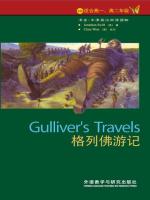111
用户698517
"Gulliver's Travels," written by Jonathan Swift, is a
satirical masterpiece that has captivated readers for centuries with its
imaginative narrative and incisive social commentary. The story follows
the adventures of Lemuel Gulliver, a ship's surgeon, who finds himself
in a series of extraordinary lands, each with its own peculiar
inhabitants and societal norms. As I delved into the pages of this
classic, I was immediately drawn into Gulliver's first voyage to
Lilliput, a land inhabited by miniature people. The detailed
descriptions of the Lilliputians and their minuscule world were both
fascinating and humorous, highlighting the absurdity of human conflicts
when viewed from a different perspective. Swift's use of size as a
metaphor for the pettiness of human quarrels is a testament to his keen
observation of society. The second voyage to Brobdingnag, where
Gulliver encounters giants, further emphasizes the theme of perspective.
Here, the tiny Gulliver is subject to the whims of the Brobdingnagians,
who view him as a curiosity. This role reversal challenges
Gulliver's—and by extension, our—perception of what it means to be
'normal' or 'significant.' The third voyage to Laputa and Balnibarbi
presents a stark critique of the scientific community and the pursuit of
knowledge without practical application. The inhabitants of Laputa are
so engrossed in abstract thought that they neglect the basic needs of
their society. This serves as a cautionary tale about the potential
pitfalls of intellectual detachment. Finally, the fourth voyage to the
land of the Houyhnhnms, where horses possess reason and virtue while
humans, called Yahoos, are depicted as brutish and vile, forces
Gulliver—and the reader—to confront the nature of humanity. The stark
contrast between the rational Houyhnhnms and the debased Yahoos raises
profound questions about civilization, morality, and the essence of
being human. "Gulliver's Travels" is not just an adventure
story; it is a profound exploration of human nature and society. Swift's
wit and insight are as relevant today as they were in the 18th century.
The book challenges us to reflect on our own society, our values, and
our place in the world. It is a timeless work that invites us to look
beyond the surface, to question the status quo, and to consider what it
truly means to be civilized.



 京公网安备 11010802032529号
京公网安备 11010802032529号